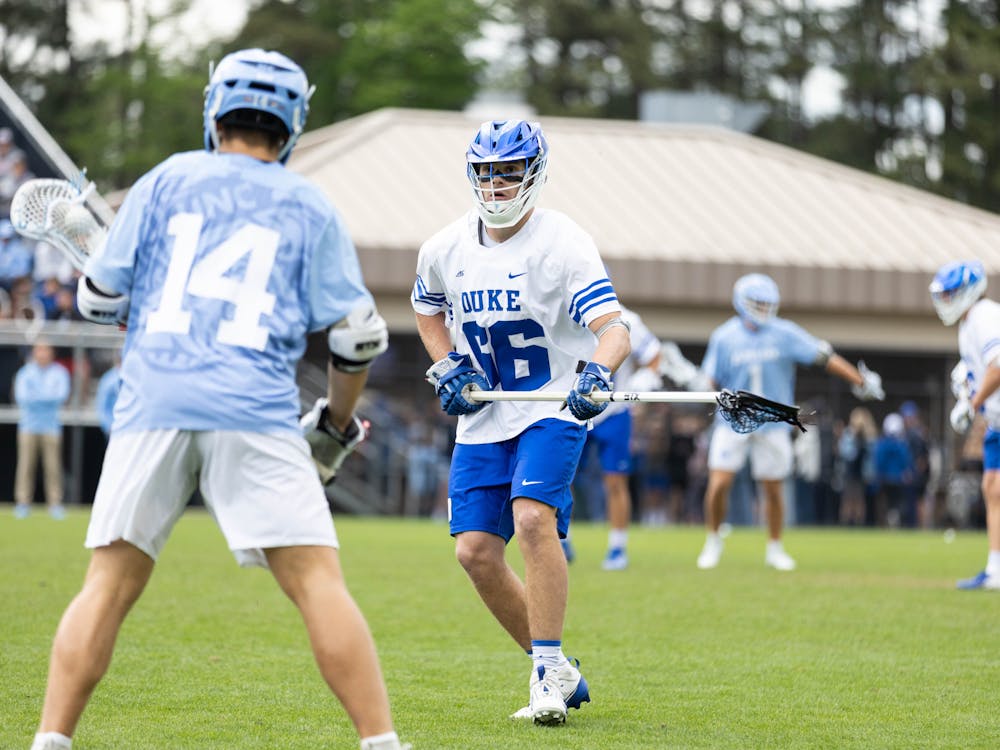A packed Koskinen Stadium awaited the Blue Devils, who needed a win to keep their postseason hopes alive.
A tumultuous, unconvincing, low-scoring middle stretch of the season meant every game from then on out — all in conference, two against top-10 teams — was essentially can’t-lose if Duke wanted to play lacrosse in May. Thrashings against Denver and Notre Dame, an early season loss to Princeton, razor-thin nonconference wins; all could be forgiven if Duke won its last three.
A rivalry matchup with No. 7 North Carolina seemed like the perfect opportunity to shift this season’s narrative and keep its goals intact. And yet the same vices that have gripped No. 12 Duke all season drowned it in an 8-7 defeat to the Tar Heels Saturday afternoon, one that all but closes the door on its grander ambitions.
The Blue Devils’ ultimate undoing was their inability to reward a monumental defensive effort with sufficient end-product in attack. An anemic offense — save occasional contributions of the offensive midfield — meant Duke was unable to respond to North Carolina’s goals late in the game or build any sort of substantial advantage before that, forcing it to essentially play catch-up even while leading.
“You hold a team to eight goals, three rebounds, a faceoff goal and a man-up goal, and you think, ‘hey, how much did you win by?’ But [it] wasn't meant to be today,” head coach John Danowski said postgame.
The killer for Duke (9-4, 0-2 in the ACC) happened within three minutes of the second-half restart.
North Carolina (9-2, 2-0) emerged with a vengeance from a 5-3 halftime deficit and promptly slotted three goals past Patrick Jameison in the Duke net, each more ruthless than the last. Ty English got things started with a rifled shot into the top left, before teammates Mason Szewczyk and Parker Hoffman found success on the break and after faceoffs. Duke’s stout transition defense and favorable delta at the spot collapsed as North Carolina’s midfielders sped downfield, stealing a 6-5 lead from a 5-3 halftime deficit that sucked the air out of the Blue Devil crowd and sideline.
The reason this sequence was so devastating was because of how incapable Duke appeared of responding.
The Blue Devils struggled to get anything going on the offensive end throughout the game Saturday, routinely bleeding out the shot clock and forcing tight-angled shots under heavy pressure, or simply whiffing on good looks. The starting attack line of Eric Malever, Andrew McAdorey and Liam Kershis had just one goal between them on a paltry four shots.
To their credit, the Blue Devils adapted to keep things close Saturday. Rather than forcing something that wasn’t working — goals from the attack — they decided to gamble on the space North Carolina afforded them further out.
By forcing the Tar Heels to contend with McAdorey, a midfielder by trade who has spent bits of his Duke career in attack, the Blue Devils drew long-poles away from their offensive midfield, stacked with strongarms and free to shoot. This was almost the entirety of their attacking threat for the whole game Saturday and, while not ideal, was far more effective than any of the offensive sets they ran.
Four of Duke’s first five goals came from the trebuchet-like sticks of Benn Johnston and Max Sloat. Johnston’s opener was the best of the bunch: a corker from 20 yards into the bottom-left corner, just moments before a Sloat sidearm on the run to the goalie’s near-post. Sloat’s and Johnston’s second goals came either side of Graham Blake’s first and only, quieting a two-goal North Carolina rally and helping Duke into the locker room up 5-3.
“We had the same number of shots that they did. We had some really good looks. I thought that our inability to create something in transition, where we had a lot of opportunities but we didn't get shots, I thought that kind of hurt us some,” Danowski said. “I don't think we shot the ball particularly well, missed the cage a bunch, but there were enough opportunities to win the game.”
Even with a two-goal lead at the break, early signs were worrying for the Blue Devils. Only being able to score on difficult shots from deep gave North Carolina an easy task on defense and plenty of opportunities to try and crack Duke’s back line. Although the Tar Heels only found a way through eight times, those eight goals came far more fluidly and timelier.
That much was true from the start. After Duke spurned the game-opening faceoff with a shot well wide of the right post, English sent his man looking with a perfect right-handed swim dodge, feeding it to Owen Duffy for a spin and North Carolina’s first score of the afternoon — the type of chemical team goal the Blue Devils were never able to cook up.
What will be frustrating to Duke fans and Danowski was that the defense was broadly excellent. It held North Carolina scoreless for 14 minutes in the first half, and forced a shot-clock violation, multiple turnovers and a crease violation. A nearly quarter-long quarantine should have allowed the Blue Devils to build a buffer on North Carolina, but their severe lack of attacking fluidity meant they only escaped the first quarter up 2-1.
“Defensively, we were — I mean, to hold the team to eight in the ACC is really remarkable,” Danowski said. “But offensively, again, we're still a mixture … [Some] old, [some] new people and it shows at times.”
Get The Chronicle straight to your inbox
Sign up for our weekly newsletter. Cancel at any time.
The Blue Devils have two more opportunities this regular season to prove themselves to a skeptical selection committee, beginning Saturday at home against No. 4 Syracuse.

Andrew Long is a Trinity senior and recruitment/social chair of The Chronicle's 120th volume. He was previously sports editor for Volume 119.

